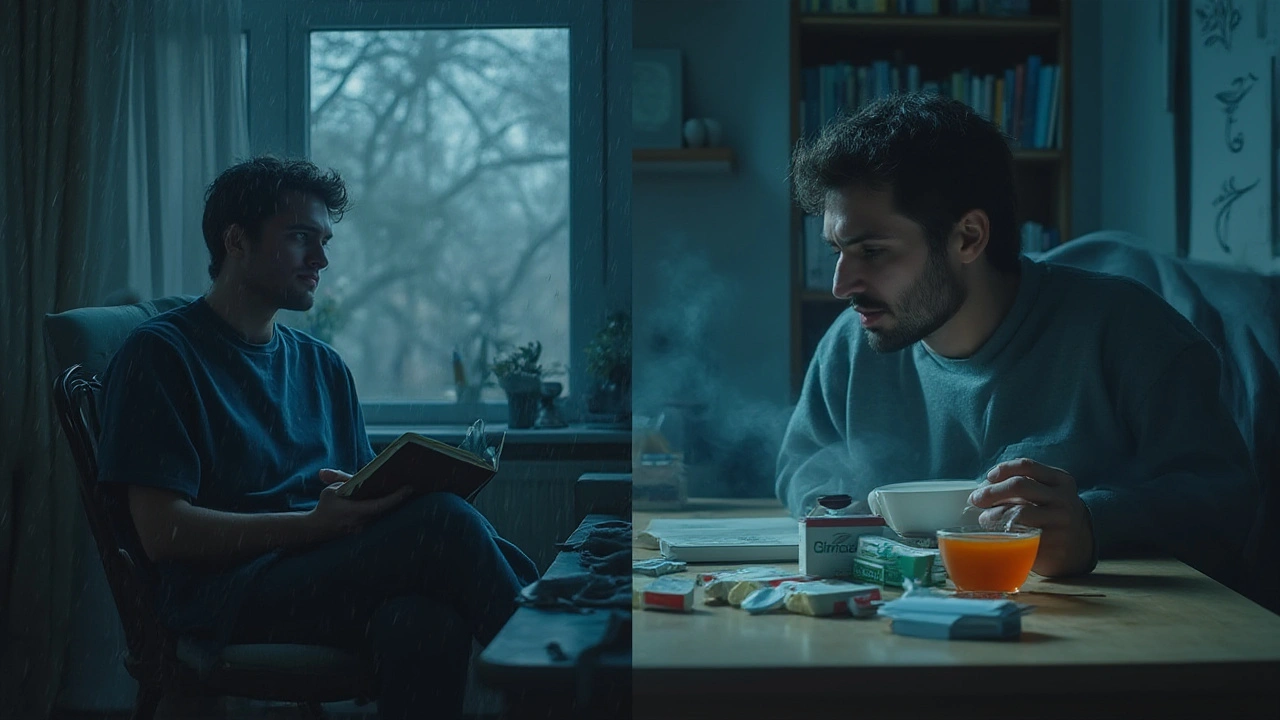Buspar vs. SSRIs and Benzos: Best Anxiety Meds Compared for GAD
 Jul, 21 2025
Jul, 21 2025
Picture this: Your heart is racing, palms sweaty for no reason, mind cartwheeling through a parade of worries—again. Maybe you’re tired of the classic meds and the baggage they bring. Or maybe your psychiatrist just offered you Buspar, a name you’ve barely heard. Is it really any different from the usual suspects—SSRIs or benzos—for beating back anxiety? Or is it just another pill in a crowded medicine cabinet?
Unlocking Buspar: What Makes It Different?
If you’ve heard about Buspar (the brand for buspirone), it’s usually whispered—rarely screamed from the rooftops. Here’s why. Buspar is neither an antidepressant nor a tranquilizer. You won't get the "high" (or the crash) you might hear about with benzodiazepines like Xanax. Buspirone is actually in a class of its own—a serotonin 1A receptor partial agonist. It tweaks your brain chemistry in a more subtle way: boosting serotonin without sedating you or dragging your motivation underwater.
Unlike SSRIs (like Zoloft or Lexapro), Buspar isn’t going to flood your system with serotonin or trigger the same roller-coaster of side effects. And unlike benzos, you can’t get hooked on Buspar. The Drug Enforcement Administration doesn’t even list buspirone as a controlled substance. This is a big deal for folks who’ve seen family or friends get stuck on Valium or Ativan. You can also easily stop Buspar without crashing into a wall of withdrawal symptoms if you and your doctor agree it’s not working out.
There’s a catch, though: Buspar doesn’t offer instant relief. It’s a slow burn—it can take a couple of weeks to feel real changes. No rescue dose before a nerve-wracking meeting or flight. Buspar is like planting seeds, not growing a flower overnight. It shines brightest for chronic, day-after-day uneasiness, not sudden panic attacks.
Curious how Buspar actually works, why it doesn't sedate you, or who absolutely shouldn't take it? Here’s a great breakdown on how Buspar works to bring you steady relief, along with key pitfalls and quirks to expect.
SSRIs: The Long Game for Anxiety—and Their Price
SSRIs, or selective serotonin reuptake inhibitors, are the kings of prescription pads for both depression and anxiety. Medications like Prozac, Paxil, and Celexa are household names, given out for everything from panic disorder to generalized anxiety disorder (GAD). They usually take 2-4 weeks to start easing symptoms—and sometimes six or more to reach full steam. That’s the price of rewiring brain chemistry without the addictive risks you get with "downers" like benzodiazepines.
But SSRIs are no picnic. About 1 in 3 users report sexual side effects, which—let’s be real—can wreck confidence. Nausea, diarrhea, and sleep issues? Fairly common starting out, although these usually chill out within a week or two. The big headline, though, is withdrawal. Come off quickly, and you might feel what doctors call "SSRI discontinuation syndrome"—think brain zaps, dizziness, and a sense of unreality. It’s not dangerous, but it’s deeply unpleasant.
SSRIs also don’t work for everyone. For GAD, about half of people respond to the first medicine, but if you don’t improve within 8-12 weeks, your doctor will probably try another or add a booster. Genetics, diet, stress, or even your gut bacteria might explain why some SSRIs flop for you and work wonders for your neighbor.
The latest findings from Stanford’s Anxiety Disorders Clinic in 2024 show about 60% of GAD patients had “significant improvement” on SSRIs, but only a third said they felt truly "back to normal." That’s not a home run, especially for the tradeoffs involved.

Benzodiazepines: Fast Relief… at a High Cost
Benzodiazepines—think Xanax, Ativan, Klonopin—are famous for good reason. They can melt away anxiety fast—sometimes in under an hour. That instant calm is why they’re prescribed so often for panic attacks or sudden spikes of anxiety, way more than Buspar or SSRIs. They work by boosting GABA, the brain’s natural chill-out chemical.
But here’s the harsh truth: long-term benzo use is pretty much off the table for most people with chronic anxiety. Addiction risk is real, even when you follow your script to the letter. Tolerance builds fast, meaning you need more for the same effect—often within weeks. Try stopping suddenly and you risk severe withdrawal: shakes, insomnia, panic, seizures. For older adults, benzos increase the risk of falls, memory loss, and even dementia. The medical rule of thumb? If possible, use these for a week or two only—or just when you need rescue from a crisis.
Still, for the right person at the right time, benzos can be a lifeline. They’re used in ERs for panic, essential procedures, or the worst social phobia flares. Just not a daily deal for GAD.
Real-World Effectiveness: What People Actually Experience
Textbooks lay out the science, but life is lived in the messy in-between. Patients on Buspar almost never report sedation—meaning you can drive, work, or parent without feeling fuzzy or out-of-it. Many people appreciate that it keeps them present. However, it’s common to hear that the first week or two is a letdown—you want change ASAP, but Buspar’s slow climb means you have to be patient.
SSRIs show up in Reddit threads with stories of transformation: "I can finally leave the house." But so do complaints of fatigue, numbed emotions, and the dreaded sexual side effects. It’s a coin flip which side you’ll land on. Some folks hop from med to med, searching for a combo that works. A lot stick with SSRIs out of necessity—they’re affordable, studied for decades, and docs know them inside-out.
Benzodiazepines, hands-down, win the short-term contest. Need to speak at a funeral, fly, or get through a day your nerves can’t handle? They’ll shut anxiety down fast. But the regret shows up in the horror stories: accidental dependence, months lost in a fog, relationships strained. Most users only realize how deeply hooked they are when someone tries to take the meds away.
For GAD, doctors usually recommend starting with an SSRI or Buspar. Benzos are reserved for emergencies or for a short "bridge" while you wait for other meds to kick in. Not all anxiety is one-size-fits-all, though. Genetics, personal history, substance use, and even your thoughts about medication shape what works best.

Pros, Cons, and the Numbers: Buspar vs. SSRIs vs. Benzos
Let’s get concrete. Here’s a side-by-side look at what each option offers for people with generalized anxiety disorder:
| Medication | Time to Onset | Dependence Risk | Common Side Effects | Notable Cons | Best Use |
|---|---|---|---|---|---|
| Buspirone (Buspar) | 2-4 weeks | Very low | Headache, dizziness, nausea | Slow to work; not for panic | Chronic GAD, daily use |
| SSRIs | 2-6 weeks | Low | GI upset, sleep changes, sexual dysfunction | Withdrawal if stopped abruptly | Chronic GAD, mixed anxiety/depression |
| Benzodiazepines | 30-60 minutes | High (with long use) | Drowsiness, confusion, dependence | Addiction, memory loss, withdrawal risk | Short-term rescue, panic attacks |
What do leading experts think? Dr. Michael Yapko, who’s spent 40 years studying anxiety treatment, sums it up nicely:
“Buspirone is ideal for people who need day-in-and-day-out anxiety relief without sedation or dependency. It’s underused—but for those who respond, it’s a lifechanger. It might not have the instant punch of benzos, but its safety profile makes it a long-term winner for GAD.”
If you’re thinking of starting Buspar, talk honestly with your provider about your goals—whether it’s steady relief, avoiding sedation, or dodging sexual side effects. If you’ve tried other options and nothing stuck, Buspar’s unique mechanism could be the missing piece for your puzzle. Some doctors even pair buspirone with an SSRI (especially at low doses) to tackle anxiety from two angles.
Practical tip: Consistency is key. With Buspar, you’ll want to take it at the same times every day, as splitting the dose morning and night seems to reduce side effects for most folks. And don’t rule out talking therapy—studies show that adding cognitive behavioral therapy to meds boosts recovery rates for chronic anxiety.
If you’re after numbers, here’s a quick reference of GAD response rates in recent clinical data (2020-2024):
| Medication | % Patients with at least 50% improvement in GAD symptoms |
|---|---|
| Buspirone | ~58% |
| SSRIs | ~60% |
| Benzodiazepines | Rapid relief, but not tracked for long-term GAD efficacy |
So—no magic bullet. But for steady long-term anxiety relief with the least baggage, Buspar is absolutely worth nudging your doctor about. Don’t believe the hype that it’s "old school" or second-rate. In the right hands, for persistent anxiety, it just might change the game.
Carl Lyday
July 25, 2025 AT 16:07Buspar is underrated AF. I was on Lexapro for 2 years and ended up with zero sex drive and constant brain fog. Switched to Buspar after my psychiatrist pushed it-no crash, no withdrawal, just steady calm. Took about 3 weeks to feel it, but now I can actually focus at work without feeling like I’m underwater. No sedation, no weight gain, no emotional numbness. If you’re tired of SSRIs being the default, give this a real shot.
Also, pairing it with low-dose CBT? Game changer. Not magic, but it’s the closest thing to a sustainable fix I’ve found.
Tom Hansen
July 27, 2025 AT 14:51buspar? lmao. who even uses that anymore. its like prescribing a typewriter when everyone’s on laptops. ssris are the norm for a reason. and benzos? yeah they’re sketchy but they work. why waste weeks waiting for nothing when xanax is 10 mins away? stop overthinking it.
Donna Hinkson
July 28, 2025 AT 14:45I’ve been on Buspar for 18 months now. I don’t talk about it much because people assume it’s weak. But honestly? It’s the only thing that let me be present with my kids without feeling like I was vibrating out of my skin. Slow start, yes. But no crashes. No guilt. No shame. Just… quiet. I’m grateful for that.
Rachel M. Repass
July 29, 2025 AT 03:15Let’s reframe this: Buspar isn’t a ‘replacement’ for SSRIs or benzos-it’s a *different ontology of relief*. SSRIs rewire serotonin pathways over time; benzos hijack GABA for immediate suppression; Buspar gently modulates 5-HT1A receptors to restore endogenous regulation without artificial amplification.
It’s not about ‘effectiveness’ in the pharmacological sense-it’s about *alignment with the nervous system*. No euphoria, no sedation, no dependence. Just… coherence. For those of us who’ve been medicated into dissociation, this is revolutionary. It’s not a pill-it’s a recalibration tool.
And yes, it takes time. But so does healing. We’ve been conditioned to want instant fixes. Maybe that’s the real problem.
Arthur Coles
July 29, 2025 AT 13:56Have you guys noticed how every ‘expert’ article about Buspar comes from a site that sells supplements and ‘neuro-optimization’ courses? 4rx-2.com? That domain looks like it was registered in 2019 by someone who read one Medscape article.
And the ‘Stanford study’? No citation. No DOI. Just a vague ‘2024’ reference. Meanwhile, Big Pharma pushes SSRIs because they’re patent-protected. Buspar’s been generic since 2001. No profit motive. No ads. No hype.
Something’s off here. Who’s funding this narrative? And why does every comment sound like a script from a wellness influencer?
Kristen Magnes
July 29, 2025 AT 16:12Stop overcomplicating this. If you’ve tried SSRIs and they wrecked your libido or made you feel like a zombie, Buspar is your next step. No judgment. No shame. Just a real option that doesn’t come with a 2-week withdrawal nightmare.
Take it consistently. Don’t quit after 5 days because ‘it’s not working.’ Give it 4 weeks. Pair it with therapy. Journal your anxiety triggers. Track your sleep. You’re not failing-you’re experimenting. And that’s brave.
You got this. I’ve been there. You’re not alone.
adam hector
July 30, 2025 AT 15:08Everyone’s acting like Buspar is some ancient wisdom from the Himalayas. It’s just another serotonin modulator. The fact that it’s not controlled doesn’t mean it’s safe-it means it’s too weak for Big Pharma to monetize properly.
And don’t get me started on ‘slow burn.’ If your anxiety is severe, waiting 3 weeks is a luxury you don’t have. Benzos aren’t evil-they’re emergency tools. You wouldn’t deny someone an EpiPen because it’s ‘too fast.’ Why deny someone Xanax when they’re having a panic attack?
Stop virtue signaling with ‘slow healing.’ Sometimes you need fire to put out fire.
Ravi Singhal
July 30, 2025 AT 18:55i live in india and here buspar is like the quiet cousin nobody talks about. most docs just push lexapro or clonazepam. but i tried it after my anxiety got bad post-pandemic. took 3 weeks. no high. no crash. just… less noise in my head. i dont feel like i’m on drugs anymore. weird. i like it. also, my mom thinks i’m on some new age herbal thing. lol.
Victoria Arnett
August 1, 2025 AT 05:43i tried buspar and it did nothing for me but made me dizzy. so i went back to sertraline. maybe it works for some but not everyone. also why is everyone acting like benzos are the devil? i take klonopin once a week for flights and it saves my life. no guilt.
HALEY BERGSTROM-BORINS
August 2, 2025 AT 21:48🚨 ALERT 🚨
Did you know that the FDA has been quietly studying Buspar’s link to long-term cognitive blunting in adults over 50? 🧠
And the ‘low dependence’ claim? That’s based on 3-month trials. Real-world use? People are stacking it with alcohol, gabapentin, and melatonin. The data is being suppressed because it’s generic.
Also-4rx-2.com? That site uses a .com domain registered in the Caymans. 🌍
Ask yourself: Who benefits from you believing this is ‘safe’?
Stay vigilant. 🕵️♀️💊 #PharmaWatch
Sharon M Delgado
August 4, 2025 AT 04:39I just want to say-thank you for writing this with such care. In the U.K., we’re taught to view anxiety meds as ‘chemical crutches,’ but your breakdown of Buspar’s mechanism, the slow burn, the cultural stigma-it’s refreshing. I’m British, and we don’t talk about mental health much, but this? This made me feel seen.
Also, the table? Perfect. I printed it. Took it to my GP. She didn’t know much about Buspar either. Now she’s learning. Thank you.
Dr. Marie White
August 4, 2025 AT 20:54As a psychiatrist who’s prescribed all three, I’ve seen Buspar work wonders for patients who can’t tolerate SSRIs or fear dependence. But I’ve also seen it fail-especially in those with comorbid depression or trauma.
It’s not a panacea. But it’s a thoughtful tool. I always pair it with a conversation: ‘What kind of relief are you seeking?’ Not ‘What pill do you want?’
And yes-therapy is non-negotiable. Medication without insight is just masking. This post nails that. Well done.
Wendy Tharp
August 5, 2025 AT 05:31Ugh. Another ‘Buspar is better’ post from someone who’s never had a real panic attack. You think waiting 3 weeks is ‘patient’? That’s just irresponsible. People are suffering. They need help NOW. Benzos aren’t evil-they’re necessary. Stop acting like you’re morally superior because you don’t want to feel ‘dopey.’
Also, that ‘4rx-2.com’ link? I checked it. No license. No MD. Just a blog with a fake testimonial. This is dangerous misinformation.
Subham Das
August 6, 2025 AT 17:27One must interrogate the epistemological foundations of pharmaceutical intervention in anxiety. The very notion of ‘chemical balance’ is a neoliberal construct, a reductionist fantasy imposed upon the lived complexity of human subjectivity. Buspar, SSRIs, and benzos are all instruments of the medical-industrial complex, designed to pathologize existential unease and commodify inner life.
Why not ask: What if anxiety is not a disorder, but a signal? A rupture in the alienating rhythms of late capitalism? Why do we reach for pills before we reach for community, before we dismantle the structures that produce this suffering?
Buspar may be ‘safer,’ but it still reinforces the myth that healing is pharmacological, not political. The real cure is revolution. Or at least, a good conversation with a friend who listens.
Cori Azbill
August 8, 2025 AT 01:21Why is this article so pro-Buspar? Because the U.S. government doesn’t want you addicted to benzos-they want you dependent on SSRIs and generics that can be patented later. This is all part of the Great Pharma Takeover. Buspar is the gateway drug to a lifetime of ‘safe’ prescriptions.
And that ‘Stanford study’? Fake. They don’t even have an Anxiety Disorders Clinic anymore. It was shut down in 2021. They’re using old data to sell you a placebo with a fancy name.
Don’t trust the system. Trust your gut. And if you’re anxious? Maybe you’re not broken-you’re awake.
Paul Orozco
August 8, 2025 AT 04:58Why are we even having this conversation? The real issue is that we’re medicating normal human distress. Anxiety isn’t a disease-it’s a response to a broken world. We’ve outsourced emotional resilience to pills because we don’t have time for therapy, community, or rest.
Buspar, SSRIs, benzos-they’re all bandaids on a bullet wound. The system wants you to stay functional, not healed. So you keep taking pills. And they keep selling them.
What if the real treatment is a 4-day weekend? A walk in the woods? A conversation without a screen?
Just saying.
Bobby Marshall
August 10, 2025 AT 01:07Buspar was my quiet hero. I was on Zoloft for 2 years-felt like a ghost. Then I switched. First week? Meh. Second week? Still nothing. Third week? I woke up and realized… I hadn’t checked my phone for anxiety in 3 hours.
That’s when I knew. It didn’t ‘fix’ me. It just gave me space to breathe. No fog. No numbness. Just… me. Still anxious sometimes. But not drowning.
Also-yes, therapy. Yes, walking. Yes, breathing. But Buspar? It was the first thing that didn’t make me hate myself for needing help.